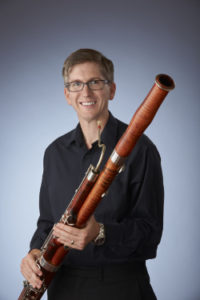After a lot of consideration, I decided to title this column with a mute joke, since my predecessor, Peter de Boor titled his column Dropping the Mute, and since I really appreciate puns. In the end, as a bassoonist, mutes are an unfamiliar and generally unwanted hindrance—why do with a mute what you could do with a reed? Still, although I share Peter’s reluctance to speak about myself, I’d like to take a moment as your new Editor of Senza Sordino to explain why this new position feels so personal to me.
In 2009, I started my professional career in the Atlanta Opera and the Atlanta Ballet Orchestras, two members of the Regional Orchestra Players Association. At some early point in my tenure in both of those organizations, an overworked colleague asked if I wanted to become the ROPA representative. I didn’t really know what I was getting into, but I had the sense that there was a way to serve my fellow musicians beyond showing up and playing bassoon.
My first ROPA conference was eye-opening, because I was introduced to a vast group of people working beyond the concert hall to promote orchestral music and its players. That summer, I met Ray Hair, Debbie Newmark, Rochelle Skolnick, Paul Austin, Nathan Kahn, Randy Whatley, and many other influential people with whom I still collaborate today.
Service as ROPA delegate also made me a part of the Atlanta Opera Orchestra’s negotiating committee (which made me grateful for the ROPA negotiation workshop). Though I was nervous participating so early in my career, it was a good introduction into the process, and I eventually served on three negotiation committees (even chairing one) in my short time with the opera orchestra.
When I joined the Indianapolis Symphony Orchestra, I asked to become the delegate to ICSOM as soon as I was eligible.
The most eye-opening moment of my time in ICSOM so far came at the conference in Utah in 2019. It became clear that our next negotiation in Indianapolis would be contentious, but also that many of the resources and people we would call upon during a difficult negotiation were literally in the room with me.
During a town-hall session, I asked how many people had been part of a work stoppage in their career. Not having experienced it myself (and worried for what would come in Indianapolis), it was in large part a personal question. About half of the delegates raised their hands.
Is it an inevitability that we will all suffer some sort of work stoppage in our careers? Maybe. But for some reason, it was comforting to know that so many people in that room not only understood first-hand, but were also committed enough to the collective good that they continued to serve.
In the most general sense, we all suffered some sort of work stoppage during 2020. But even for those of us who suffered the COVID-19 shutdown most acutely, the music never stopped. Most orchestras continued making music, and in places where management abdicated entirely, musicians filled the silent void on their own.
When my own orchestra went on hiatus, I complained to Paul Austin that I felt useless because there was so little for me to add to the discussions happening on our delegate zoom calls. His response changed my outlook: ICSOM is a place to share information and ideas, no matter what is happening in your orchestra (or not). That flow of information is vital, whether it happens among the Governing Board, between delegates, or through the stories that we tell in Senza Sordino.
We are in a different era than those who have come before us. There are tools at our disposal to provide clear, truthful information to vast numbers of people in ways that would have sounded impossible even just twenty years ago, when Facebook was a platform for college students and Twitter was a 140-character curiosity.
We must continue to spread that information—our truth—as widely as possible. It is a privilege to publish your stories in Senza, and I look forward to serving as your editor.






